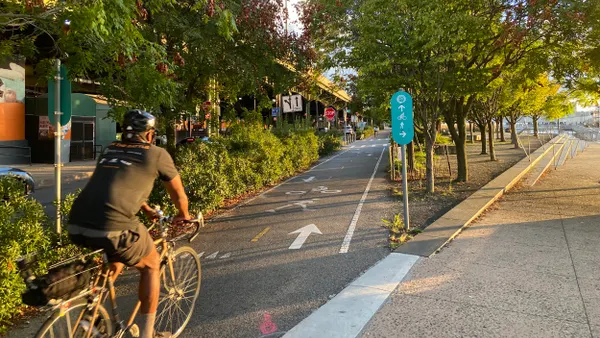Dive Brief:
- After years of resistance to phasing out gas-powered cars, the auto industry has signaled it will embrace President Biden's plan to achieve net-zero carbon transportation and accelerate the transition to electric vehicles (EV).
- The Alliance for Automotive Innovation (AAI) representing GM, Ford, Honda and others, has committed to working with the new administration on a national electrification program that would bring all automakers "under a unified set of common requirements" that could include rising percentages of EV sales.
- A "patchwork" of state transportation policies and goals "certainly makes things much more difficult," Dan Bowerson, AAI's director of environment and energy, said Tuesday at a winter policy summit hosted by the National Association of Regulatory Utility Commissioners (NARUC) .
Dive Insight:
AAI represents auto makers producing 99% of the cars and trucks sold in this country. The group announced last week that its members will invest $250 billion in vehicle electrification by 2023, and that it stands ready to "achieve greater environmental improvements than current requirements."
Discussing the state of electric transportation at NARUC's annual event, Bowerson said the current set of various state policies has held back the adoption of emissions-free vehicles.
California, last year, set a goal for the sale of all new cars in the state to be zero-emission vehicles (ZEV) by 2035. California leads the nation on electric vehicle adoption, and its ZEV program mandates have been adopted by a growing number of other states.
But according to Bowerson, states adopting the mandate do not automatically see increases in electrification, if there is not sufficient charging infrastructure in place.
"We've seen a lot of areas where mandates don't necessarily make markets," Bowerson said. "We certainly see a federal program that would allow us to have a single opportunity to address the market as the path forward. A patchwork certainly makes it more difficult."
There has been a recent spate of EV-related announcements. GM unveiled plans to sell only zero-emissions cars within the next 15 years. Ford announced plans to invest $29 billion in EVs through 2025. The state of Washington is considering a ban on the sale of internal combustion light duty vehicles by 2030.
Tesla, along with other EV infrastructure companies and utilities, is advocating for full EV adoption in the United States by 2030. The automaker — now with a market capitzation of more than $800 billion and valued higher than several other major car companies combined — last year joined the Zero Emission Transportation Association (ZETA) to advocate for rapid expansion of plug-in vehicles.
"It just didn't feel like there was a DC-based organization that was pushing for full electrification by 2030," Rohan Patel, Tesla's senior global director of public policy and business development, said at NARUC's Tuesday event.
Patel said some policy changes are necessary to reach the accelerated EV target, including reforming the 30C tax credit for charging infrastructure and funding existing programs.
"There's a lot of Department of Energy and Department of Transportation assistance programs out there for states that need some basic funding," Patel said, "so states can utilize that funding in the way they think is most useful."
Biden has announced a plan to support the development of 500,000 electric vehicle chargers across the nation, and for the federal government to transition its fleet to electric.
"With leadership at the federal level, there is certainly an opportunity to engage the states, to think about building out the interstate [charging] system," said Bowerson. Biden's goal to install a half million chargers is "a great goal ... but nationally is not anywhere close to enough. California alone is going to need more than 1.5 million chargers by 2030."
"If we're talking scale, we've got a long way to go. But I do think there's a great opportunity with the new administration for increased electrification and an infrastructure buildout," Bowerson said.











